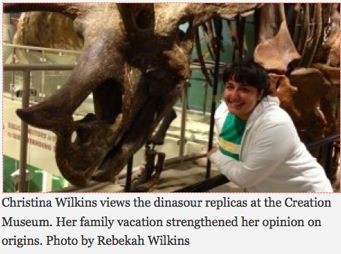I rarely have good news lately, but today I have two encouraging stories to share.
The first was originally posted at Answers In Genesis. We need more Christian scientists like Dr. Georgia Purdom to give their testimony and also demonstrate how science does NOT contradict the Bible and its historical accounts, but affirms it.
The second story was written by Christina Wilkins, a biology major at Mid America Nazarene University.

Genesis And Biblical Authority: Challenging Nazarenes in West Virginia
This past weekend I had the opportunity to speak at Dunbar Church of the Nazarene in Dunbar, West Virginia. This was a special privilege for me because I was raised in the Nazarene church and taught for six years as a biology professor at Mount Vernon Nazarene University. On Saturday I presented twice to the women of the church, sharing my testimony and the foundational importance of Genesis to biblical womanhood. On Sunday I gave presentations on the importance of Genesis to biblical authority and the eugenics movement, both historical and modern. The pastor of the church, Greg Hudson, taught on the Seven C’s in seven sermons before my arrival, so the congregation was well prepared and very receptive.
Pastor Hudson shared with me that he heard Ken Ham speak at a chapel service at God’s Bible College (Cincinnati) back in 1994 (just as AiG was beginning). He said the service greatly impacted him and made him realize how important Genesis is to biblical authority. From my conversations with Pastor Hudson and the members of his congregation, I know that he has a great love for God and the truthfulness of His Word. He is gravely concerned—as am I—about the theological liberalism that is beginning to take hold in the Nazarene denomination. Both of us throughout the weekend challenged the congregation with examples of this liberalism as it concerns not only Genesis but also other areas such as homosexuality and the existence of a literal hell. (I encourage you to read Ken’s recent blog post about an article written by two professors at Nazarene universities). We pray that those we spoke to will become equipped and uphold God’s Word within the Nazarene denomination.
This trip was also special for me because my daughter Elizabeth got to accompany me as my “assistant.” She unpacked DVDs, helped organize the resource tables, handed out materials, and more. I was very proud of her (in case you can’t tell), and I look forward to her coming to future events when possible. We also enjoyed eating several meals with and attending a minor league baseball game with Pastor Hudson and his wife Julie and daughter Hannah. Hannah and Elizabeth got to spend time together, especially when I was speaking, and I am grateful for the friendship they formed.
This is an exciting week, as I’m really looking forward to the Answers for Women conference beginning Thursday at the Creation Museum. If you haven’t registered, don’t worry; you can still register at the door! Please be in prayer for this conference, that many women will be encouraged and equipped to defend God’s Word.
Keep fighting the good fight of the faith!
Creation is no joke: MNU Biology Major Comes Clean
(Source: Christina Wilkins: http://trailblazer.mnubox.com/2012/04/09/creation-is-no-joke-mnu-biology-major-comes-clean/)
Last week, I wrote an April Fool’s article with an opinion that no one on campus would believe was truly mine: that I was an evolutionist.
I am a biology major, so I’ve studied evolution. At my first biology class, I was hit hard with the fact that there is no clear consensus on this issue among Christians.
I’ve come to realize that even though I don’t agree with theistic evolutionists about origins, there is still a lot that we do agree on. I have a special bond with biologists, who marvel at God’s creation. I can respect them as believers and as intelligent people.
My April Fool’s article was a joke because it was written by me. The day after publication, my fellow biology majors told me how they laughed at my article. Strangers, however, didn’t think it was so funny.
Last summer at the Creation Museum, my spirit was refreshed. I saw Biblical truth come to life in a way that doesn’t contradict what I’ve learned from science. I felt stretched as well as uplifted.
In fact, some of my fake arguments were inspired by one room in the Creation Museum walk-through. One side of the room shows the modern family in church, and the pastor is preaching that Christians shouldn’t get caught up in the debate because the Bible wasn’t meant to be a science textbook.
The foundation of Biblical truth is being undermined, resulting in a gospel stripped of power. If Genesis isn’t historical fact, how can we trust that the resurrection is a historical fact? The point is that what we believe about Genesis matters.
Yesterday was Easter, when we celebrate that Christ’s death and resurrection redeemed us from our sin. That sin was made an inherent human trait when Adam and Eve sinned, ruining the world that God described as good.
Romans 5:15 says, “For if the many died by the trespass of the one man, how much more did God’s grace and the gift that came by the grace of the one man, Jesus Christ, overflow to the many!” The sin and death that entrapped me before I knew Christ came from one man’s sin, and I was saved through one man’s sacrifice.
In Romans 5:12, it is clear that death came into the world through the first sin. If it took billions of years of death for humans to evolve, and then have sinned, how could death be the result of that sin? In this view, God must have described the death, and associated suffering, as good.
And what about the wages of sin? Sunday school taught us Romans 6:23. If the wages of sin isn’t death, where is the need for the gift?
I can’t believe that the creation vs. evolution debate doesn’t matter.
God said that he created whole organisms to reproduce after their kind, so I believe that complex systems could not have been created by small steps. (Genesis 1:25)
God said that the fountains of the deep were opened up during the worldwide flood, so I believe that the Grand Canyon is evidence of that. (Genesis 7:11)
God said that he created everything that flies, whether we call them reptiles or birds, on the fifth day, so I believe Archeoptryx was created on that day as well. (Genesis 1:20)
God said that he created organisms to be fruitful and multiply, so he provided genetic variability within each kind. “Junk DNA” implies that if we don’t know the function of something, it has no function. God also created man, including every strand of DNA, out of the dust, so I don’t assume any of that was junk. (Genesis 1:28, Genesis 2:7)
I’m going to run the risk of being long-winded to throw one last real opinion out there, and one that I first heard at the Creation Museum. When I read Genesis, I see that the first attack on God from the devil was an attack on God’s word. Genesis 3:1b says, “’Did God really say, ‘You must not eat from any tree in the garden’?’” He questioned something that should have been clear to Eve because God said it. Genesis is just as clear and more than just an elegant narrative.
I would rather ask, “Does the evidence really say…?” than “Did God really say…?”
Christina Wilkins
Addendum: Excerpt From Dr. Henry Morris
(Thanks to David Cloud who sent this out this today)
The following is excerpted from The Beginning of the World by Dr. Henry Morris, pp. 12-15. Morris had a Ph.D. in hydraulics and hydrology from the University of Minnesota. For thirteen years he was Professor of Hydraulic Engineering and Head of the Civil Engineering Department of Virginia Polytechnic Institute and University. He was a Fellow of the American Association for Advancement of Science and the author of the textbook Applied Hydraulics in Engineering.
_________________
It is significant that present processes, which are the only kinds of processes which can be tested by the scientific method, are not in any way creative processes. That is, the basic laws of modern science, which describe these present processes, are laws of conservation and deterioration, not of creation and integration. These laws deal with the fundamental behavior of matter and energy, which actually include everything in the physical universe, and are known as the first and second laws of thermodynamics.
Thermodynamics (from two Greek words meaning ‘heat power’) is the science dealing with the conversion of heat and other forms of energy into work. It is now known that everything in the universe is energy in some form, and everything that ‘happens’ is basically an energy conversion process. Thus, the first and second laws of thermodynamics could just as well be called the first and second laws of science. All processes in the universe, as far as known, have to obey these two laws.
The first law of thermodynamics is also called the law of energy conservation. This law states that, although energy can be changed in form, it is not now being either created or destroyed Since all physical phenomena, including matter itself, are merely different forms of energy, this clearly implies that creation was an event of the past and is no longer going on.
The second law of thermodynamics, stated in nontechnical form, says that all physical systems, if left to themselves, tend to become disorganized. Thus, machines wear out, processes run down, organisms get old and die. Any temporary increase in organization requires an input of energy from outside the system itself.
These two universal laws are basic in all disciplines of modern science. Verified by thousands of experiments, from the nuclear level to the astronomic level, with no known exceptions, they clearly indicate that nothing is now being created and taht the original creation is ‘running down.’
This all proves, as well as ‘science’ is able to demonstrate anything, that evolution, which requires a continuing universal process of development and integration, is simply not true at the present time. This is why no one has seen evolution occurring.
There is nothing whatsoever in science to prevent us from accepting the revealed fact that God created all things, calling them into existence ex nihilo … in a fully developed and functioning state right from the beginning. This fact is confirmed not only by Scripture but also by the two laws of thermodynamics. The second law states, in effect, that the universe must have had a beginning: otherwise, since it is now running down, it would already be dead. The first law, on the other hand, states in effect that the universe could not have created itself. It must have been created, therefore, by some adequate Cause beyond itself. ‘In the beginning God created the heaven and the earth’ is the most scientific statement that could possibly be made about the origin of the universe, based on the known laws of science.

You must be logged in to post a comment.